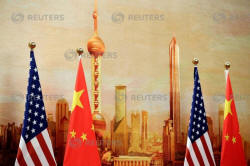|
The meeting took place with the world's top two economies
already locked in a trade dispute and tit-for-tat tariff war.
Last month the U.S. Commerce Department put Fujian Jinhua
Integrated Circuit Co Ltd on a list of entities that cannot buy
components, software and technology goods from U.S. firms.
U.S. semiconductor company Micron Technology Inc, a maker of
memory chips with factories in Virginia and Utah, has accused
Jinhua and Taiwanese partner United Microelectronics Corp of
stealing its chip designs in a lawsuit in California.
"We consider this an unwarranted charge and firmly oppose the
presumption of guilt to our companies," a Chinese official told
the WTO, according to a transcript of remarks seen by Reuters.
Washington is concerned the Chinese firm could flood the market
with cheap chips of the same type made by U.S. companies that
supply the U.S. military.
Should the U.S. chipmakers go out of business, the military
would lose a supplier for an item that must come from the United
States, presenting a national security threat.
The Chinese official said that Jinhua had not yet started
production and was far from threatening DRAM (dynamic random
access memory) circuit manufacturers in the United States.
"In our point of view, the real purpose of the U.S. measures is
to maintain the monopoly interests of the U.S. DRAM industry,"
he said.
A U.S. official declined to comment when contacted by Reuters.
Jinhua and United Microelectronics countersued Micron in China,
where courts sided with them and banned some of Micron's chips
in China.
(Reporting by Tom Miles; editing by Stephanie Nebehay and
Kirsten Donovan)
[© 2018 Thomson Reuters. All rights
reserved.] Copyright 2018 Reuters. All rights reserved. This material may not be published,
broadcast, rewritten or redistributed.
Thompson Reuters is solely responsible for this content.
 |
|




